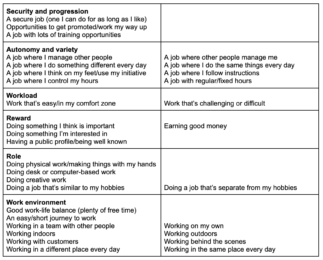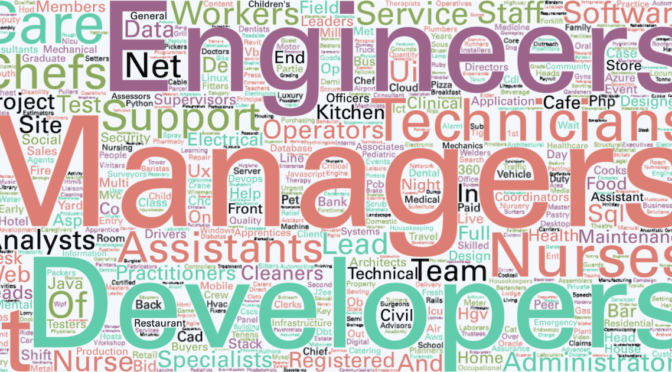It might seem like a paradox, but career conversations focus far too much on the jobs young people want to do when they’re older.
This year, as part of my exciting new freelance portfolio, I’m working with 16-18 year old trainees at the SAND Project to see what happens when we approach conversations about future jobs in a different way.
Work attribute preferences
In a nutshell, we’re investing time discussing the types of work the trainees have a preference for, rather than the jobs they want to do. We’re focusing on what researchers call ‘work attribute preferences’. As a result, we’re aiming to have conversations that sound like this:
“I want to do a job where I make people feel good about their physical appearance and where I own and run a small premises”
Rather than this:
“I want to set up my own barber shop”
Our conversations might dip into specific talk about jobs – maybe based on trainees’ recent work experience placements. That’s fine. But we’re deliberately carving out space for wider conversations about types of work, as part of a research project that’s running throughout this academic year.
How are we doing it? New tools for the job
It’s fairly commonplace to base career conversations around work attribute preferences, rather than specific jobs. But existing approaches generally have two shortcomings, which we’re aiming to address as part of our work this year. First, conversations about work attribute preferences tend to be used as a limited ‘warm up’ to talking about jobs. Spend 15 minutes talking about the types of work that appeal to you; get handed a list of jobs you might like. Second, work attribute conversations are generally built around a predetermined, closed list of job features, which don’t let young people add their own, personalised preferences into the mix.
So we’re using new tools to make sure our work attribute conversations take place over plenty of time, and allow trainees to feed in their own ideas.
Using a wiki survey, we’re encouraging trainees to spend a few minutes, every few days, playing a game of Would you rather…? on their phones. It’s a simple survey-based tool which randomly generates pairs of work attributes from an initial bank of 32 ‘seed’ ideas, based on existing research like this and this.

Trainees tap the work attribute they have the strongest preference for, and then they’re shown another randomly generated pair of work attributes. They can vote on as many pairs as they like; the survey doesn’t have a start or an end. Even with a small number of seed ideas, they’ll never be asked to vote on the same pair of work attributes twice: there are 32 factorial (2.6×1035) different combinations of work attributes in the pool. This allows for detailed stress-testing of trainees’ work attribute preferences.
And the pool of ideas is growing: the second strength of the wiki survey is that trainees can add their own ideas to the work attribute pool any time they like. Their fellow trainees will then see that work attribute appear in pairwise contests when they take the survey.

Given this high degree of flexibility, we’re keeping the survey open for the whole year, so this critical thinking about work attributes can take place over an extended period of time alongside trainees’ courses.
After a few days of voting and around 600 votes cast, we’re seeing that the least popular work attribute is ‘working outdoors’, which tends to lose 9 out of 10 contests against other work attributes. Maybe that’s because it’s freezing at the moment, and this work attribute might fair better in the spring. Meanwhile the most popular work attribute is currently ‘earning good money’, which wins around 8 in 10 contests against other work attributes. Given the state of our economy, I know I’d also be upvoting that one pretty heavily if I was taking the survey.
I’m holding regular trainee forums throughout the year, to discuss the emerging trends from the survey and the considerations that are going on underneath trainees’ voting decisions. So the survey is a source of data as well as a reflection tool.
Why does it matter?
For enterprise-focused settings like SAND, spending longer discussing work attribute preferences and avoiding the rush to job titles supports career conversations that don’t hinge around pre-existing jobs. This creates space for considering non-employee based options like starting a business, working a portfolio of jobs, or doing work in an emerging sector, rather than just focusing on existing roles in the labour market.
As a source of data on how young people’s work attribute preferences shift over time, this work is feeding into the SAND Project’s 2022-23 impact evaluation. It’s also a reflection tool for trainees, and supports the wider conversations they’re having about their future career aspirations. And we’re also aiming to publish our findings on the trainees’ work attribute preferences, to grow the existing research base.
As a final note, we used to gather nationally representative data on the work attribute preferences of the working-age population in England, through the Skills Survey. We’ve not gathered this data since 2006. In my view, debates about matching labour demand and supply are dominated nowadays by the employer’s perspective, with annual skills surveys tending to focus exclusively on the skills employers need and the gaps they’re trying to fill. A little more space for the worker’s perspective – particularly during post-covid upheaval and churn, high rates of economic inactivity and the persistent shadow of low productivity – would be a good thing.
